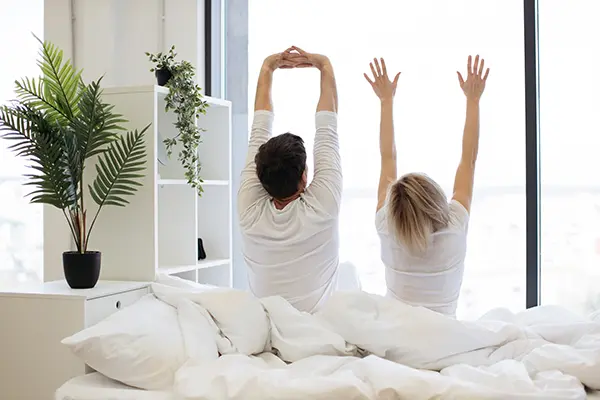Falling asleep should feel effortless, but for many people, bedtime can turn into a frustrating battle. Whether your mind won’t quiet down or your body feels restless, sleep troubles are incredibly common. The good news is that there are proven, natural strategies that can help you fall asleep more easily—and understanding why sleep can sometimes be so hard is the first step.
In this post, we’ll cover 12 practical ways to make falling asleep easier, along with reasons why sleep doesn’t always come easily.
Why Is It Sometimes So Hard to Fall Asleep?
Difficulty falling asleep, also called sleep-onset insomnia, can happen for many reasons:
- Stress and Anxiety – Racing thoughts and worries can keep your mind active long after bedtime.
- Poor Sleep Habits – Using phones or screens before bed exposes you to blue light, which suppresses melatonin production.
- Irregular Schedule – Sleeping at different times each day disrupts your body’s circadian rhythm.
- Caffeine or Heavy Meals – Consuming these too late in the day can keep your body alert.
- Medical Conditions – Issues like sleep apnea, chronic pain, or restless leg syndrome can interfere with rest.
Understanding the cause can help you find the best solution.

12 Ways to Fall Asleep Faster
Going to bed and waking up at the same time every day helps regulate your body clock.
Activities like reading, meditation, or a warm shower signal to your body that it’s time to wind down.
Turn off phones, laptops, and TVs at least an hour before bed to avoid blue light disruption.
- Adults: Most experts recommend a temperature between 60 and 67°F (15.6–19.4°C).
- Older adults: A 2023 study found that older adults may sleep most efficiently in a warmer range, between 68 and 77°F (20–25°C).
- Infants: To reduce the risk of Sudden Infant Death Syndrome (SIDS), it is important to avoid overheating. Experts suggest a slightly warmer range of 65 to 70°F (18.3–21.1°C).
Caffeine is a stimulant that can last in your system for up to 6 hours, and alcohol disrupts deep sleep.
Deep breathing, meditation, or progressive muscle relaxation can calm the nervous system.
Regular movement helps improve sleep quality, but avoid vigorous workouts right before bed.
Avoid heavy, spicy, or sugary meals close to bedtime that may cause discomfort.
Daytime naps longer than 20 minutes may interfere with nighttime sleep.
White noise, calming music, or nature sounds can block out distractions.
Lavender and chamomile essential oils are often linked with improved relaxation and sleep.
Spending time outdoors in natural light helps keep your circadian rhythm on track.

Final Thoughts
Falling asleep doesn’t have to feel like a struggle. By making small changes to your daily habits and sleep environment, you can train your body to rest more naturally. If sleep problems persist for more than a few weeks, consider speaking with a healthcare provider to rule out underlying conditions.
Better sleep leads to better health—so start with these steps tonight and wake up refreshed tomorrow.
Affiliate Disclaimer
Please note that some links on this site are affiliate links, meaning I may earn a small commission if you click on them and make a purchase, at no additional cost to you.As an Amazon Associate, I earn from qualifying purchases. Rest assured, I only recommend products and services that I truly trust and believe will provide value to you.
Daily Wellness
Explore more from Daily Wellness at Little SuperGreens - featuring nutrition tips, wellness hacks, and daily habits to strengthen health and boost energy.









